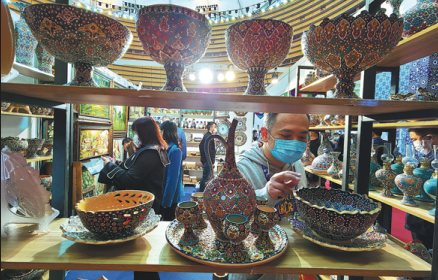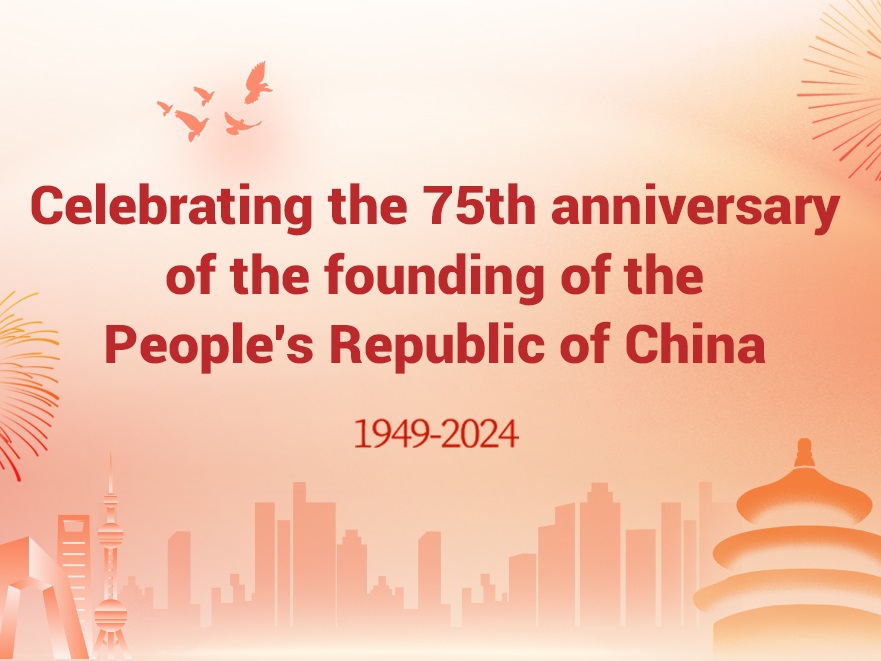Sino-ASEAN ties to deepen in next decade

Handicrafts including ceramic pottery from Pakistan are displayed during the 17th China-ASEAN Expo at Nanning International Convention and Exhibition Center in Nanning, Guangxi Zhuang autonomous region, on Sunday. YU XIANGQUAN/FOR CHINA DAILY
More mutually beneficial, open, inclusive economic and trade relationship expected
The scope and depth of business ties between China and the Association of Southeast Asian Nations will be further enriched over the next decade, supported by open markets, diversified multilateral investment and digital technology-led pathways, said government officials and business leaders.
Their remarks came after President Xi Jinping said China will work with ASEAN to advance all-around cooperation under the guidance of the Strategic Partnership Vision 2030, in a speech delivered via video link at the opening of the 17th China-ASEAN Expo and China-ASEAN Business and Investment Summit on Friday.
In his speech, Xi highlighted the need for the two sides to sustain the smooth flow of trade, promote mutual investment, open up markets wider to each other, and foster deeply integrated industrial, supply and value chains.
"China and ASEAN countries, connected by the same mountains and rivers, share close affinity and a long-standing friendship," he said, adding that the bilateral relationship has grown into the most successful and vibrant model for cooperation in the Asia-Pacific region, and is an exemplary effort in building a community with a shared future for mankind.
The blueprint, charting a new course for the further development of their mutually beneficial cooperation, has been hailed as a milestone in relations between the two sides.
The enhanced ties, combined with the recent signing of the world's biggest trade deal-the Regional Comprehensive Economic Partnership-will help both parties firmly support the multilateral trading system, keep the market open, build strong regional industrial and supply chains, and promote regional economic recovery after the COVID-19 pandemic, said Li Chenggang, assistant minister of commerce.
China will actively implement the future work plan for the upgraded protocol of the China-ASEAN free trade area, explore the realization of a higher level of market access based on the RCEP pact, and create a more mutually beneficial, open and inclusive bilateral economic and trade relationship, he said.
Thai Deputy Prime Minister and Commerce Minister Jurin Laksanawisit agreed, saying that Thailand hopes ASEAN and China can reach agreement on the rest of the future work plan covered by the upgraded protocol of the China-ASEAN free trade area, including free trade of goods and discussion on investment freedom and protection.
China has been Thailand's largest trading partner for eight consecutive years, he said. Bilateral trade and economic growth between Thailand and China in the past 10 years have benefited from the China-ASEAN free trade area, which covers trade in goods and investment.
Dato' Seri Mohamed Azmin Ali, Malaysia's senior minister for economy and minister of international trade and industry, said that consumers' spending patterns have undergone structural changes due to the impact of the COVID-19 pandemic this year. The change can be seen in the growing demand for essential goods and surging digital transactions.
As ASEAN has undergone a rapid digital economic transformation, he said, cooperation with China will help ASEAN choose a more advanced growth path, especially in the areas of digital economy and high-end manufacturing.
ASEAN and Chinese companies signed agreements on 86 investment cooperation projects on Friday in areas including infrastructure, energy, retail and logistics, at the China-ASEAN Expo in Nanning, Guangxi Zhuang autonomous region, with a total investment of 263.87 billion yuan ($40.13 billion), jumping 43.6 percent on a yearly basis, according to the Ministry of Commerce.
Zhang Jianping, director-general of the Beijing-based China Center for Regional Economic Cooperation, said the RCEP will become a fundamental cooperation frame and platform that enables economic and trade cooperation between China and ASEAN to evolve to new heights on the basis of achievements made in the past decades. The regional market is expected to be fully integrated in all economic and trade sectors.
Forest Cao, general manager of the Shanghai branch of Pacific International Lines, a large Singaporean shipping and logistics services provider, said he sees significant future development potential in goods and services trade between China and ASEAN.
Apart from meeting exporters' demand for ocean shipping between China and ASEAN member economies, the company plans to add investment in warehouses and freight train facilities over the next five years, Cao said.
Zhang Li in Nanning contributed to this story.


